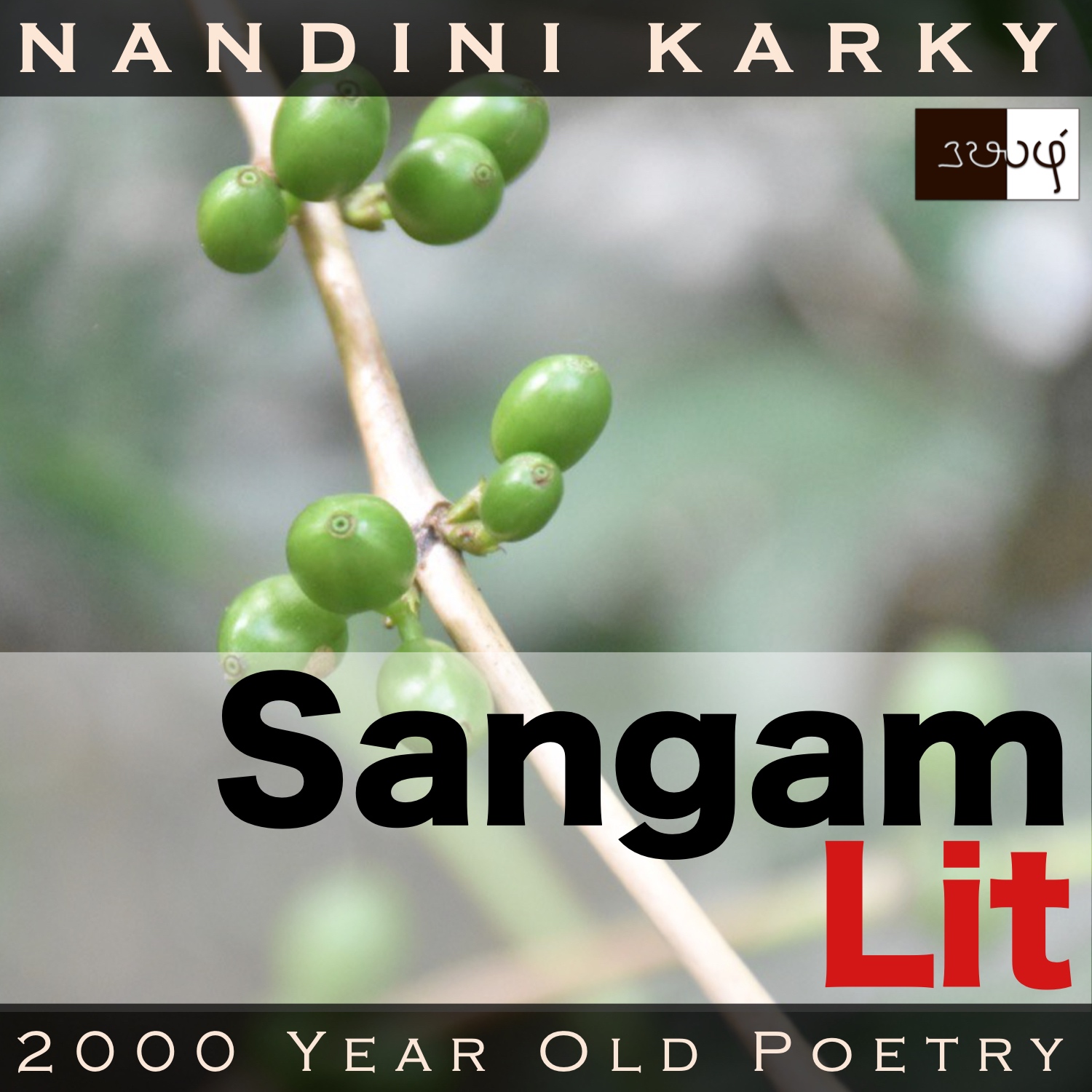Podcast: Play in new window | Download
Subscribe: Apple Podcasts | Spotify | Amazon Music | Android | iHeartRadio | TuneIn | RSS | More

In this episode, we perceive the shades in a mother-daughter relationship depicted in Sangam Literary work, Natrinai 66, written by Inisantha Naakanaar. The poem is set in the ‘Paalai’ landscape or the drylands and speaks in the voice of the mother, reflecting on the state of her daughter, who has eloped with the man she loves.
மிளகு பெய்தனைய சுவைய புன் காய்
உலறு தலை உகாஅய்ச் சிதர் சிதர்ந்து உண்ட
புலம்பு கொள் நெடுஞ் சினை ஏறி, நினைந்து, தன்
பொறி கிளர் எருத்தம் வெறி பட மறுகி,
புன் புறா உயவும் வெந் துகள் இயவின்,
நயந்த காதலற் புணர்ந்தனள் ஆயினும்,
சிவந்து ஒளி மழுங்கி அமர்த்தனகொல்லோ-
கோதை மயங்கினும், குறுந் தொடி நெகிழினும்,
காழ் பெயல் அல்குல் காசு முறை திரியினும்,
மாண் நலம் கையறக் கலுழும் என்
மாயக் குறுமகள் மலர் ஏர் கண்ணே?
Quite a hot beginning with the word ‘மிளகு’ meaning ‘pepper’. The pungent, burning feeling of tasting pepper can be sensed in one’s throat or ‘எருத்தம்’, as we relish this poem. The heat of the drylands is further painted by the phrase ‘வெந்துகள் இயவு’ meaning ‘a hot, dust-filled path.’ A little dove makes an appearance with ‘புன் புறா’ and you get to glimpse tears flowing in ‘கலுழும்’ from those ‘flowery eyes’ in ‘மலர் ஏர் கண்ணே’! Rhythm dances throughout the poem with ‘உலறு – உகாஅய்’, ‘சிதர் சிதர்ந்து’, ‘பொறி – வெறி’ and ‘மாண் நலம் – மாயக் குறுமகள்’. Peppers, pigeons and pretty girls – Let’s delve into the heart of this mother’s words.
The mother finds that her daughter has eloped with the man she was in love with. She reflects on her daughter’s state by saying, “Looking like peppers and with the same hot taste, small berries appear on the dried branches of the ‘ukai’ tree. Chasing away the bees buzzing around, a small pigeon feeds on these berries and with much sadness, climbs on the tall branches and thinks about its female, as the taste of the berries burn its spotted, bright throat. On such a scorching, desert path walks my young daughter. My dark-skinned, beautiful girl! She who cries with anguish, spoiling her beauty, just because her garlands get twisted, or her bangles slip from her wrists or because gold coins on her waistband gets twirled. Although she has gone with the man she loves, won’t her flower-like eyes redden and lose its lustre, as she walks on that hard path?”
Going beyond surface senses, let’s understand the deeper layers and fascinating facets hidden in this poem. First, we should meet and delight in this ‘ukai tree’, which is commonly known as the ‘toothbrush tree’. This is a short-statured tree, which also has the Arabic name ‘miswak’ which we may recollect having seen in oral hygiene products. The stick from this tree has apparently been used for over 7000 years as a natural toothbrush. Currently found more pervasively in the Middle East countries, it has an intricate connection with Islamic customs. The tree is also naturally found in abundance in the ‘Mannaar’ region of SriLanka. This poem clearly illustrates that this tree was not introduced by Islamic invaders in India but has existed naturally here, thousands of years ago. The reference to this tree we find here is to the pepper-like fruits that grow on this tree. Mostly, it’s found in desert-like regions and the pigeon in our poem, perhaps not having had food for many days, dives into these fruits and devours them. Only to find the pungent taste of these fruits burning its throat. As it sits atop the tree, its hunger is satiated but a new bother is pecking from within. The mother talks about this pigeon not just to describe the arid path which the lady would be traversing with her man but also a subtle metaphor for how the girl might be feeling. Like that hungry bird, the girl has got what she yearns for, the uniting with her love. Mentioning the burning throat of the bird, the mother hints that it all might not be simply a bed of roses. Knowing her daughter well or thinking that she knows her well, the mother says that here’s a little, innocent girl who starts crying for every small thing. Be it a twisted garland or a slipping bangle or twirling coin on her waistband! So, how can she bear the hardships of this path with her man, this mother wonders.
It made me reflect how children seem to be frozen at some particular age in a parent’s mind. The duties of caring and protecting the young baby, that’s born completely helpless into this world, does not let the parent’s mind grow at the same rate, a child does! Perhaps this is why the mother can only think back to how helpless and naive, her little girl was and is not able to see that she is grown and has chosen a life of her own!




Share your thoughts...